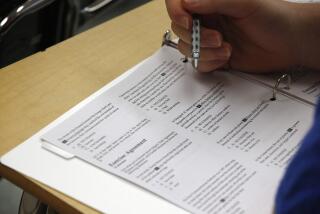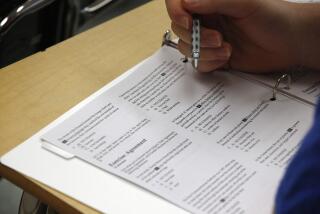A 5-Year Quest to Ace the SAT
In the elite students’ race for admission to top colleges, classes that prepare them to take the SAT examination at a cost of $250 and up have become the norm.
But one tutoring outfit based in Laguna Beach takes the pursuit of the mighty 1600--a perfect score on both verbal and math sections of the test--much further. Cambridge Academic Services offers parents what is loftily called the Cambridge SAT Colloquium, a night class for youths that starts as early as the seventh grade, five years before most students take the test.
Founder Lisa Muehle said her philosophy for the colloquium arose in reaction to the glut of SAT crash courses that encourage students to cram just weeks, sometimes days, before the test.
“Even if you wait until the 11th grade, you’ll feel a lot of pressure,” she said. “The early bird does get the worm.”
Unlike most SAT courses that focus on exam taking skills, the colloquium actually teaches to the test with years of classes that tutor students in the kinds of vocabulary and math questions that crop up on the standardized exam.
At a cost of close to $500 annually for five years--$2,500 for the complete course of SAT preparatory training--the tutorial starkly illustrates how prepping for top scores has a lot to do with the money that parents are prepared to pay.
But money alone isn’t enough. To be accepted to the program, students must have a minimum 3.2 grade-point average, be identified as eligible for Gifted and Talented Education programs, or recommended for enrollment in the SAT training by a teacher.
Whether the 6-year-old program actually works after all those requirements is an unanswered question. Muehle said she has no statistics on the average score of students who have gone through the colloquium.
Having seventh-graders study for a test they will take their senior year of high school is rare if not unique, said Charles Rooney, assistant director of FairTest, a nonprofit organization in Cambridge, Mass., that advocates eliminating the SAT’s role in college admissions. He calls the early preparations “ridiculous,” though understandable.
“As long as these tests serve as gatekeepers, it’s a rational response to do as much as you can to get through that gate,” he said.
His concern is that devoting such enormous amounts of time and resources to the “narrow and limited” arena of test taking is killing children’s abilities for critical thinking as well as crushing their spirits. Not to mention the cost.
“Test prep is very unevenly distributed,” Rooney said. “It’s only available to families who can afford it.”
Muehle said the colloquium isn’t about emptying the pockets of nervous parents, but slowly marinating
students’ brains in actual information--new vocabulary and math lessons.
“Anyone who gets a 1500 at the end of 10th grade can stop studying,” Muehle said, referring to the mock tests students take. “I’m not going to take their money for another year. Although they probably could have a 1580 after another year with us.”
The colloquium classes are small--eight to 12 students--and spread out over a year. The seventh-graders come once a week, and higher grades attend biweekly, for 90-minute sessions.
With her 14-year-old daughter dreaming of going to Harvard, Yale or Stanford, Sue Hall of Laguna Beach decided to enroll her in the colloquium last year.
“The classes don’t make her feel crazy,” Hall said. “She doesn’t feel pressured by it.”
Some students take the class for just a year, but Muehle has had a handful who have stuck with it for the full five, a commitment she encourages.
“You can’t just waltz into Berkeley or UCLA with a mediocre SAT score,” she said.
Statistics from the University of California bear her out. In the fall of 1997, UC Berkeley accepted only 42% of non-engineering applicants who had a 4.0 grade-point average and an SAT score of 1200 to 1390. Among students with the same GPA but an SAT of 1400 to 1600, the acceptance rate jumped to 75%.
Some people who offer the crash SAT preparatory classes say that there are advantages to their method.
“Some students need to be pressured,” said Cobert Kim, owner of Alpha Academy, an Orange County company with offices in Fullerton and Yorba Linda. “There are a lot of students who are very lazy.”
Kim requires a 3.0 GPA and charges a monthly rate of $300 for 30 hours of class. He said many of his clients take about three months of preparatory work--for a total cost of $900--before they either drop out or plunge into the test taking.
“I say get the studying over with,” he said. “The sooner the better.”
Muehle credits her competitors with offering valid classes, but sticks to her long-term study philosophy. And her roster boasts some test-savvy clientele, including one student who did pull off a perfect SAT score.
Miles Jacob of Laguna Beach got a 1600 after taking two years of the colloquium. It is a rare feat: Of the 1.2 million students who took the SAT last year, only 673 scored a 1600.
*
Despite his stellar score, Jacob was rejected by Brown University in Providence, R.I., his first choice. He decided to stay on the West Coast and is a freshman at Pomona College in Claremont.
His mother, Laurel, said that if colleges and universities are going to require high scores on the SAT, they ought to consider a way to help students who can’t pay for private tutoring and classes.
“The ones that get left behind are the ones whose families can’t afford it,” said Jacob, who credits the colloquium with helping her son achieve his perfect score.
She said that although her family can spare the money, she is torn about the emphasis on SAT scores because she wants the focus at her children’s school to return to learning.
“I want my daughter to love biology, but all the teacher focuses on is that . . . test,” she said.
According to Susan Wilbur, director of admissions at UC Irvine, parents and students sometimes believe that the SAT is more important than in fact it is.
“The SATs play a role in the admissions process, but they’re only one part,” she said. “The public needs to know that we’re looking for a balanced student.”
Wilbur said that the best preparation is to hunker down in school and read lots of books.
“Students who have challenged themselves within their school curriculum are well-prepared for these exams,” she said. “That kind of sustained preparation over the long run is the most effective.”
Still, the emphasis on getting into college has pushed today’s students into an accelerated adolescence, according to some parents.
Hall said she is concerned about overbooking her daughter, yet wants her SAT score to remain competitive.
“When I was in ninth grade, I never thought about college,” said Hall, 50. “It’s terrible how competitive admission has become, but it’s now a fact of life.”
More to Read
Sign up for Essential California
The most important California stories and recommendations in your inbox every morning.
You may occasionally receive promotional content from the Los Angeles Times.









